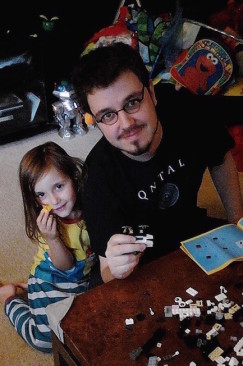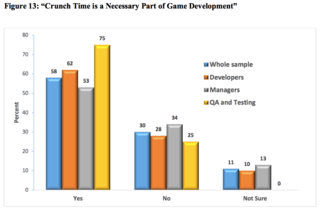
80 hours a week.
That’s the benchmark that Alex St. John, co-creator of DirectX and founder of WildTangent, sets for productive game work in a rancid article in VentureBeat. 80 hours a week, he says. Don’t enter the games industry with a “wage-slave attitude.” Don’t you dare complain about it. Quit if you don’t like it. When I wrote my initial piece here at Giant Bomb about the state of working conditions in game development, some folks doubted that attitudes like this existed anymore. But here it is, and it reflects something a lot deeper than just the rantings of one man.
The article in question has been making wide rounds in circles who pay attention to the games industry, labor, or both. For good reason: St. John’s take is as extreme as it is real. Not content with the 60 hour crunch of the industry, he wants you to know that you’d better go in even harder. Though not so hard that you take games too seriously: He doesn’t want you “mailing in a 40-hour work week making video games”, with the emphasis (his, not mine) letting you know that, as much as he talks about suffering for games as art, you shouldn’t take video games too seriously. They’re not a real job, after all.
Though he’s somewhat obscure these days, St. John is not some small player in the industry. He was one of the first developers on DirectX, that ubiquitous graphics platform which contemporary PC gaming is built on. He later founded WildTangent, a studio which has found mild success at best, but which stuck around since 1998.

St. John’s biography is big, but central to his self-mythologizing seems to be that he burned out at Microsoft during DirectX development. One old profile of St. John says that he “would pass out at his keyboard and straggle into morning meetings with key marks on his face,” and that the burnout led to his “marriage disintegrating.” But St. John didn’t buck up and push on, he chose to get himself fired to survive. That’s not an isolated citation; he certainly finds it interesting enough to air his emails from the time on his blog.
One can imagine a version of St. John’s story that is triumphant. He was a rural Alaskan kid who worked hard to make an indelible stamp upon PC gaming, only to crash and burn to find his own way once he was independently wealthy. Imagine if he’d used his reflections on this journey to address that same burn out culture, instead of enshrining it. Instead, we have a man who has blogged his way down Bell Curve territory and given presentations about the desirability of “non-asperger’s technical women” for your team. And while his recent VentureBeat article ended up producing thoughtful responses (like this one from Rami Ismail), St. John only doubled down, following up with a screed about lazy millennials.
Though it might seem odd that a man would burn himself out working crunch and then insist crunch is the price of doing business in the games industry, the truth is that this only reflects a long entrenched ideology. Recall Mike Capps’ infamous remarks about Epic never hiring people who are unwilling to work 60+ hours a week. Those comments were made at an International Game Developers Association (IGDA) event back in 2008. The IGDA, for the uninitiated, is an organization which claims the mantle of improving developer work-life balance, among other things.

Lost in the noise of St. John’s article is that it was intended as a rebuttal to an interview VentureBeat conducted with Kate Edwards, head of the IGDA. The IGDA has long had the best surveys of developer work life in the world; I used them myself in an article for The Guardian. Besides the surveys, the IGDA occasionally issues a strongly worded blog post or press release when they feel the need to directly advocate for workers (as they did with Alison Rapp just a few weeks ago). But that’s where the organization’s activism ends, leaving the bulk of its efforts at improving the lot of games workers to panels and polite discussion.
I was curious if St. John himself had ever worked an IGDA event and, sure enough, he has, at a 2010 leadership conference. While the VentureBeat article is doubtlessly the most high profile St. John’s been since the old days, his views on crunch are hardly recent or something he’s been reticent to talk about. Which brings the question: Why does the IGDA, as an organization ostensibly devoted to the betterment of crunch, let people like St. John and Capps use their events as platforms for their special brand of “leadership”?
When I’ve called for more worker organization in the past, some plugged in readers have suggested that that IGDA already serves that purpose, and this is an example of why we need more. The division between labor advocacy groups that rely on discourse and those that focus on active organization is longer and more storied than I can cover on here, but press releases have never been enough. There is no roundtable or discussion panel which is going to convince St. John to back away from his position. There’s no accord to be reached with him. He is telling the IGDA, the workers of the industry, and the watching world exactly what he thinks of compromise: there is none and, if you think there is, he’ll weed you from his company by going “churn and burn.”
What’s more, the fact that crunch is still a problem is proof that there are plenty of more Alex St. Johns out there--they just aren’t as outspoken as him. They want art which you suffer for, your payment arriving in the form of a love which won’t feed you or pay your rent. The contours may be slightly different; maybe the St. John at one company only wants 60 hours a week, the St. John at another offers just pizza for your crunch hours, while yet another St. John pays really well but still seems to be a little too eager to crunch when it’s not necessary. My own St. Johns, at Funcom, were pretty fair, but botched production schedules eventually meant 6 and 7 day weeks with eventual layoffs for a big portion of our quality assurance team when Age of Conan flatlined. As I’ve said before: Work conditions often suffer for reasons beyond base cruelty, but they can still be addressed. And in case it isn’t clear, this is hardly a problem unique to game development. Many other industries face issues like poor work-life balance and high turnover rates, too. But we’re equipped to address (and invested in) games, so that’s where we’re focusing.

The problems the industry currently faces--the ones that Alex St. John holds up as virtues instead of faults--are problems, and they’re the sort that the IGDA either cannot or will not solve. They are not equipped or authorized to negotiate on behalf of workers, and when I asked their survey team about the potential for the IGDA to take a larger role in organization, they were quick to point out that they don’t intend to be a union. This leaves their desire to just talk things out until they get better all the more frustrating. They have infrastructure, membership, and interest, just not the final desire for confrontation which the St. Johns of the industry clearly do.
To her credit, Edwards notes in her VentureBeat interview that the IGDA aims to turn their survey data into a system which will be used to call out those companies who do not pay their crunch time workers. This is fine, but is a ways off and is the sort of thing which may well run afoul of certain NDAs. People are fired in other industries for speaking out about workplace issues of all sorts, from labor abuse to the sale of faulty products. There is nothing at all which says the same thing cannot happen in games; it may even be likely, given the lack of protections against reprisal the lack of a union brings. . It also continues the IGDA’s single-minded focus on discussion instead of action. Will major publishers change their tune if the IGDA calls them out? Or will they just weather the storm of criticism the way they have so often in the past. Edwards is, early in the article, more interested in reward than punishment; we’re left to wonder what rewards are so good that they outweigh the gains studio heads can make by working their employees to exhaustion.

The IGDA is ultimately not a worker’s organization. Its board always has studio heads on it. The aforementioned Capps was once on the IGDA’s board of directors, which is what made his statements so galling a nearly a decade ago. This is the crux of the IGDA’s problem: How can it truly serve the interests of workers when it has a crunch proponent on its board of directors and it won’t vet its conference presenters? The answer, of course, is that it can’t.
If Edwards wants to make the IGDA more forceful in its role as unofficial voice of industry workers, it’s well-past time for proponents of crunch to be denied a place at IGDA events. Every presenter and certainly every board member should be required to sign a pledge that they will not institute crunch time at their studios. The IGDA is under no obligation to give a platform to those who are opposed to its mission statement. If it truly thinks that crunch is a scourge of the industry as it claims, it must forcefully clarify that advocates for crunch have other places they may speak about their special brand of management. Though the IGDA can’t simply talk the industry into better behavior, I do think that if their voice is clear, strong, and unshakeable, they can help to build the sort of environment and culture necessary for game developers to organize and address our industry’s most pressing concerns.
Ian Williams is a freelance writer and author based in Raleigh, North Carolina. His work has been featured in Jacobin, The Guardian, Paste, and Vice. You can find him on Twitter at @Brock_toon. You can listen to Austin chat with Ian on this past episode of Giant Bomb Presents.
204 Comments